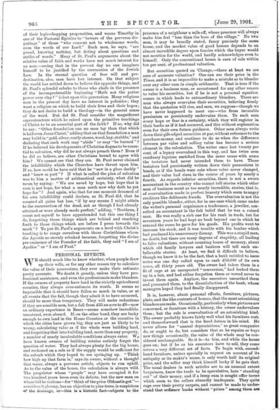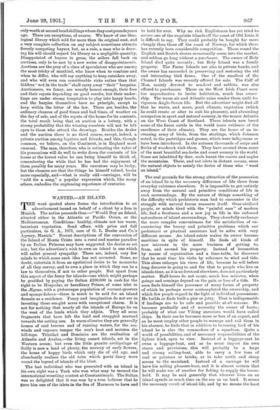PERSONAL EFFECTS.
WE should much like to know whether, when people draw up their wills, or for any other reason try to calculate the value of their possessions, they ever make their estimate pretty accurate. We doubt it greatly, unless they have pro- fessional assistance, and even the professionals make blunders. If the owners of property have land in the strictly agricultural counties, they always over-estimate its worth. It seems so impossible that it should have fallen so much in value, or at all events that the fall, though they admit it to have occurred, should be more than temporary. They will make reductions if they are sensible men, but a fall from 235 an acre to 28—now an ordinary experience in Essex—seems somehow incredible, unnatural, even absurd. If, on the other hand, they are lucky enough to own land in the Home Counties or the counties in which the cities have grown big, they are just as likely to be wrong, calculating value as if the whole were building land, and forgetting that into building land, more than any property, a number of nearly incalculable conditions always enter. We have known owners of building estates entirely forget the question of water. They had always plenty for the big house, and reckoned on a sale as if the supply would be sufficient for the suburb which they hoped to see springing up. "Think how high up that farm is," says its owner, without a thought that water, always a perverse article, objects to run uphill. As to the value of the house, the calculation is always wild. The proprietor whose " people " may have occupied it for two hundred years loves even its defects, but the new man on whose bid he reckons—for "think of the price Oldcastle got "— considers it gloomy, has an objection to pine-trees, is suspicions re the drainage, or—this is a historic fact—objects to the presence of a neighbour a mile off, whose presence will always make him feel "less than the boss of the village." No two men, it may be broadly stated, fancy precisely the same house, and the market value of good houses depends to an almost incredible degree upon fancies which the buyer would not mention for the world, and hardly acknowledges even to himself. Only the conventional house is sure of sale within ten per cent. of professional valuation..
But securities quoted on 'Change,—there at least we are sure of accurate valuation? One can see their price in the Times, and it is as impossible to make a mistake as to blunder over any other sum in simple arithmetic. That is true if the owner is a business man, or accustomed for any other reason to value his securities, but if he is not a personal equation comes in which leads to extraordinary blunders. There are men who always overvalue their securities, believing firmly that the quotation will rise, and men, we suppose—though we have never happened to meet one—who from incurable pessimism as persistently undervalue them. To such men every hope or fear is a certainty, which they will register in their books as if it had occurred, and this without explanation even for their own future guidance. Other men always write down their gilt-edged securities at par, without reference to the purchase-money, and continue to do so when the difference between par value and selling value has become a serious element in the calculation. The writer once lost twenty per cent. of a legacy overvalued in this way, and has twice seen residuary legatees enriched from the same cause with sums the testators had never intended them to have. Those testators had persistently written down their possessions in bonds, as if the bonds were coin whose value never changed, and their value had risen in the course of years by nearly a fourth. As regards inferior securities, there is not a sworn accountant in the country who cannot tell stories which other men of business scout as too nearly incredible, stories, that is, of overvaluation made in perfect honesty which seem to angry creditors like deliberate frauds. The overvaluation is not the only possible blunder, either, for in one case which came under
the writer's personal cognisance a tradesman, a jeweller, con- sulted an accountant in the full belief that he was a ruined man. He was really a rich one for his rank in trade, but for
seventeen years he had kept no book beyond one in which he entered the sums be gave for his goods. His profits went to
increase his stock, and it was trouble with his banker which had produced his unnecessary dismay. This was a stupid man, no doubt, but there are many degrees of stupidity, all leading to false valuations, without counting losses of memory, about which old family lawyers and bankers will tell such un- believable stories. At least, we find it difficult to believe, though we know it to be the fact, that a bank entitled to issue notes was one day called upon to cash 250,000 of its own notes, all thirty years old. The owner had taken them in a fit of rage at an unexpected "conversion," had locked them up in a box, and had either forgotten them or vowed never to invest them again. Anyhow, the executors unearthed them and presented them, to the dissatisfaction of the bank, whose managers hoped they had finally disappeared.
It is, however, about personal effects, furniture, pictures, plate, and the like contents of houses, that the most astonishing blunders are made. Occasionally, particularly when pictures are concerned, or furniture with a history, the owner undervalues them ; but the rule is overvaluation of an astonishing kind. The owner probably knows fairly well what his furniture cost, and thenceforward that is the fixed datum in his mind. He never allows for "annual depreciations," as great companies do, or ought to do, but considers that as he repairs or buys new things occasionally, the value of the whole may be con- sidered unchangeable. So it is—to him, and while the house goes on; but if he or his executors have to sell, they come across a very different set of facts. To begin with, second- hand furniture, unless specially in request on account of its antiquity or its maker's name, is only worth half its original price, and the seller may think himself lucky if he gets that. The usual dealers in such articles are to an unusual extent bargainers, know the trade to be speculative, hate "standing out" of their money, and if a lump sum is sought offer terms which seem to the sellers absurdly inadequate. They quite rage over their pretty carpets, and cannot be made to under- stand that ordinary books without " prizes " among them are only worth at second hand shillings where they cost pounds years ago. There are exceptions, of course. We know of one theo- logical library which sold for more than its original cost, and a very complete collection on any subject sometimes attracts fiercely competing buyers, but, as a rule, a man who is draw- ing his will should regard his library as a negligible quantity. Disappointed of buyers in gross, the sellers fall back on auctions, only to be met by a new series of disappointments. Auctions are the prey of a class of speculators who are among the most tricky of mankind, who know when to combine and when to differ, who will say anything to keep outsiders away, I and who will even run considerable risks rather than that bidders "not in the trade" shall carry away " their " bargains. Auctioneers, we fancy, are usually honest enough, their fees and their repute depending on good results, but their under- lings are under strong temptation to play into harpy hands, and the harpies themselves have no principle, except to keep within the letter of the law. There are, besides, the ordinary chances of good times and bad times, of weather on the day of sale, and of the repute of the house for its contents, the total result being that an auction is a lottery, with a strong probability that the winning numbers will not be left open to those who attend the drawings. Besides the dealer and the auction there is no third course, except, indeed, a private auction among legatees and friends, and this, though common, we believe, on the Continent, is in England most unusual. The man, therefore, who is estimating the value of his possessions will do well to write down the contents of his house at the lowest value he can bring himself to think of, remembering the while that he has had the enjoyment of them possibly for many years. His executors may be lucky, but the chances are that the things he himself valued, books more especially, and—what is really odd—carriages, will be "sold for a song," a popular expression which, like many others, embodies the unpleasing experience of centuries.





















































 Previous page
Previous page